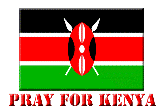A US based human rights group is alarmed about the number of governments in East Africa and the Horn, which use repressive and violent tactics to stay in power and silence their opponents.
Kenya is featured on the list, no surprises there.
Albin-Lackey says one of the biggest disappointments has been the government of political rivals President Mwai Kibaki and Prime Minister Raila Odinga in Kenya.
The coalition government, considered one of the most important regional partners for the United States and the European Union, was formed last year after disputed presidential elections sparked country-wide riots and tribal fighting. Both Kenyan leaders had pledged to work together to heal the nation and to tackle poverty and corruption.
But Albin-Lackey says renewed allegations of high-level corruption, a government attempt to implement a law designed to muzzle the media and U.N. charges that Kenyan security forces were authorized to carry out hundreds of extrajudicial killings in 2007 have all raised questions about the government's commitment to democracy and reform.
"Kenya is so hobbled by corruption and by the quality of governance that the threat of poverty and ethnic violence boiling over again into something like what we saw after the elections is becoming more and more real," he said.
Something needs to be done, but will it be done?
How much power do our human rights groups have in Kenya, to effect change?
Update
Related article: Kenya's crumbling government
Drama Of Uhuru Taking A Back Seat With Ruto Secrets In Washington
-
The signing of the Congo deal in Washington recently had too much drama
unfolding in the background. And a huge amount of it is directly linked to
Kenyan p...
8 hours ago





2 comments:
"How much power do human rights organisations have to effect change?"
Did they ever have any power?
Darius,
Indeed! It is a sad state of affairs. Is it realistic for us to live in hope?
Post a Comment